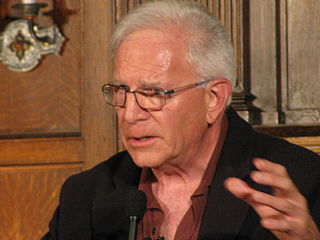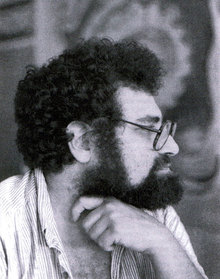Related Research Articles

David Mansfield Bromige was a Canadian-American poet who resided in northern California from 1962 onward. Bromige published thirty books, many so different from one another as to appear to be the work of a different author. Associated in his youth with the New American Poetry and especially with Robert Duncan and Robert Creeley, Bromige is sometimes associated with the language poets, but this connection is based more on his close friendships with some of those poets, and their admiration for his work. It is difficult to fit Bromige into a slot. He departs from language poetry in the thematic unity of many of his poems, in the uses to which he puts found materials, with the romantic aspect of his lyricism, and with the sheer variety of his approaches to the poem.
The Language poets are an avant-garde group or tendency in United States poetry that emerged in the late 1960s and early 1970s. The poets included: Bernadette Mayer, Leslie Scalapino, Stephen Rodefer, Bruce Andrews, Charles Bernstein, Ron Silliman, Barrett Watten, Lyn Hejinian, Tom Mandel, Bob Perelman, Rae Armantrout, Alan Davies, Carla Harryman, Clark Coolidge, Hannah Weiner, Susan Howe, James Sherry, and Tina Darragh.
Lyn Hejinian was an American poet, essayist, translator, and publisher. She is often associated with the Language poets and is known for her landmark work My Life, as well as her book of essays, The Language of Inquiry.

Rae Armantrout is an American poet generally associated with the Language poets. She has published more than two dozen books, including poetry and prose.

The term San Francisco Renaissance is used as a global designation for a range of poetic activity centered on San Francisco, which brought it to prominence as a hub of the American poetry avant-garde in the 1950s. However, others felt this renaissance was a broader phenomenon and should be seen as also encompassing the visual and performing arts, philosophy, cross-cultural interests, and new social sensibilities.

Michael Palmer is an American poet and translator. He attended Harvard University, where he earned a BA in French and an MA in Comparative Literature. He has worked extensively with Contemporary dance since the 1970s and has collaborated with many composers and visual artists. Palmer has lived in San Francisco since 1969.

Barrett Watten is an American poet, editor, and educator often associated with the Language poets. He is a professor of English at Wayne State University in Detroit, Michigan where he has taught modernism and cultural studies. Other areas of research include postmodern culture and American literature; poetics; literary and cultural theory; visual studies; the avant-garde; and digital literature.

Rachel Blau DuPlessis is an American poet and essayist, known as a feminist critic and scholar with a special interest in modernist and contemporary poetry. Her work has been widely anthologized.
Nathaniel Tarn is a French-American poet, essayist, anthropologist, and translator. He was born in Paris to a French-Romanian mother and a British-Lithuanian father. He lived in Paris until the age of seven, then in Belgium until age 11; when World War II began, the family moved to England. He emigrated to the United States in 1970 and taught at several American universities, primarily Rutgers, where he was a professor from 1972 until 1985. He has lived outside Santa Fe, New Mexico, since his retirement from Rutgers.
Kathleen Fraser was a contemporary poet. She was a Guggenheim Fellow.

David Lerner was an American outlaw poet who helped lead the influential poetry group the Babarians at Cafe Babar in San Francisco.
Ted Pearson is an American poet. He is often associated with the Language poets.
Kit Robinson is an American poet, translator, writer and musician. An early member of the San Francisco Language poets circle, he has published 28 books of poetry.
Gloria Frym is an American poet, fiction writer, and essayist.

Lorna Dee Cervantes is an American poet and activist, who is considered one of the greatest figures in Chicano poetry. She has been described by Alurista as "probably the best Chicana poet active today."
Adam Cornford is a British poet, journalist, and essayist and a great-great-grandson of Charles Darwin. From 1987 to 2008 he led the Poetics Program at New College of California in San Francisco.

Eleni Sikelianos is an American experimental poet with a particular interest in scientific idiom. She is Professor of Literary Arts at Brown University.
Maureen Owen is an American poet, editor, and biographer.
Leland Hickman was an American poet, editor, actor, and literary magazine publisher. During his lifetime, Hickman was best known as the publisher and editor of the influential magazine Temblor which was noted for the publication of many east and west coast language-related poets. His editorial and publishing activities brought the work of many established and emerging poets into the public view. Hickman has steadily gained posthumous recognition and fame for his poetry.
Peter Seaton was an American poet associated with the first wave of Language poetry in the 1970s. During the opening and middle years of Language poetry many of his long prose poems were published, widely read and influential. Seaton was also a frequent contributor to L=A=N=G=U=A=G=E, one of the influential magazines and theoretical venues for Language poetry, co-edited by Charles Bernstein. In 1978, Bernstein published Seaton's first book of poetry, Agreement, the same year that L=A=N=G=U=A=G=E magazine made its first appearance. Some of Seaton's work from this time has been reprinted in The L=A=N=G=U=A=G=E Book (1984).
References
- ↑ "X Poetics: Beverly Dahlen Tribute at Small Press Traffic Saturday December 13, 2008". December 14, 2008.
- ↑ Spare Room: Beverly Dahlen & David Abel
- ↑ "Beverly Dahlen :: Foundation for Contemporary Arts". www.foundationforcontemporaryarts.org. Retrieved April 19, 2018.